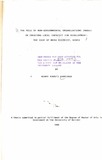| dc.description.abstract | Non-Governmental Organizations (NGOs) as agents of Development have received a great deal of attention and recognition from several avenues. Their importance is mainly based on the observation that they use "people-centred" approaches or grass-roots oriented strategies for development which enable people to participate in efforts geared towards the attainment of their basic needs. In spite of the attention that NGOs receive, there is very little empirical knowledge about their activities anywhere in the world, Kenya included. Their role and 'actual contribution s to local development has not been properly documented, let alone thoroughly analyzed. In Kenya, the ir• ac~~~al numbers is not even ... well known. In short, there has been :1~\I::"R of reliable data on the extent, 10CB.tioD and exact acti vi ties of NGOs. This then logically calls for a close analyses of their activities lest the expectations placed on them be misguided. This study therefore, is an attempt to examine the role of NGOs in one district, Meru, in Kenya. The focus of the study is the role of NGOs in local capacity creation or the extent to which they strengthen people's capacity for sustainable local development. In this study, local capacity creation is taken to mean the building and strengthening of abilities of the people to solve their own problems and initiate actions for their own benefit and take control over their own destinies. Local capacity creation further entails strengthening - xii - people's awareness, growth of confidence and consciousness-raising through participation of people in development projects or processes. Training is obviously an important aspect of local capacity creation. In order to generate adequate knowledge of the issues raised, the study adopted several methods of data collection. Primary data was gathered through interviews using a structured questionnaire. The respondents included both project leaders and ordinary beneficiaries . A lot more was abstracted from interactions and conversations with the NGOs and projects officials, in addition to participatory observation. Secondary data was obtained from evaluation reports of some of the projects, which were sampled from the lists provided by the NGOs. The study has found that NGOs' projects beneficiaries are involved in the projects mainly through their resource contributions. Their participation has been found to have some bearing or positive relationship with creation of local capacity, although participation alone is not the utmost factor in the creation of local capacity. The survey data has also shown that NGOs are making considerable contributions in training and educating their project beneficiaries, although results "in this area would be enormous if NGOs entered into partnership with other development agencies in training and educating their beneficiaries at the grassroots. Existing local institutions are noted to be providing appropriate entry points for NGOs interventions at the grassroots. Conclusions, recommendations and issues for further research emanating from this study are numerous. The study notes that NGOs programmes should be centered around long-term and sustainable development even when relief and welfare activities are being undertaken. The need' for creating an enabling environment for NGOs operations has also been underscored. A country-wide study on various issues of NGOs contributions is also called for in order to generate more knowledge about NGOs in Kenya | |

